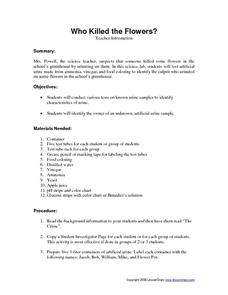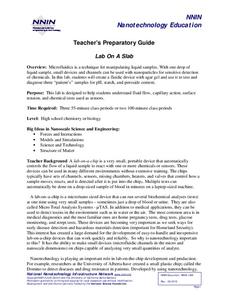Lesson Snips
Who Killed the Flowers?
This could be really good, or it could be really bad! The crime to be solved is, "Who went pee in the flowerpot?" Given four imitation urine samples, young chemists or crime scene investigators perform pH, glucose, and turbidity...
National Nanotechnology Infrastructure Network
Lab On A Slab
Capillary action is the frugal chemist's dream ... the less liquid used, the more tests they can run! Learners experiment with the best design to maximize the benefits of capillary action. Using a liquid sample, they design a capillary...
Discovery Education
Urinalysis
What do lab tests reveal about a patient's health? Scholars perform a simulated urinalysis on two different patients by testing color, pH, glucose levels, and protein levels. Then, they compare their findings to what they know passes...
National Nanotechnology Infrastructure Network
The Blood Glucose Monitor
Become a doctor for a day! Learners analyze synthetic urine and blood samples to diagnose diabetes. They use lab procedures to identify abnormal glucose levels, and, as a follow-up activity, they build a model to illustrate the...
Manitoba Education and Early Childhood Learning
Forensic Sciences: A Crime Scene Investigation Unit
Mr. Bergman has been murdered and we need you to solve the crime! The cross-curricular unit covers 11 different types of forensic science and includes 17 activities. Scholars perform blood type analysis, blood spatter analysis,...






